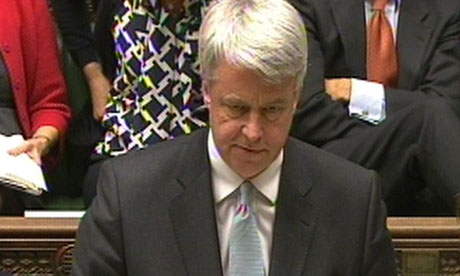
Andrew Lansley, the health secretary, intends to pursue through the courts the cosmetic industry companies that are refusing free operations to women wanting substandard breast implants removed.
Lansley is prepared for a full-scale confrontation with the recalcitrant elements of the industry after the declaration of the Harley Medical Group that it will not pay for removal of the PIP implants that have triggered great anxiety in women in the UK and in France. Transform and the Hospital Group have also said that women will have to pay.
The health secretary is inviting women refused free help to go to their GP, who will refer them to an NHS hospital for removal – although not replacement – if that is what they want. But Lansley says the taxpayer should not be expected to foot the bill and the government will actively seek to recover the cost from the private chains.
"We will pursue them extremely aggressively through the courts," a source close to Lansley said. "We will go after them."
Lansley believes the clinics are turning their backs on their patients.
"For them to abdicate responsibility we think is immoral," said the source.
On Friday Lansley said the NHS would remove and replace implants for free, where women wanted it, if their operation had originally been on the NHS. This would normally have been breast reconstruction after cancer surgery. The big providers of private healthcare who also perform some cosmetic surgery, including Nuffield Health, BMI and Spire, have all said they will follow suit.
Lansley is now urging Harley to rethink. "Eight private companies are offering to replace implants for their patients – Harley Medical Group should follow suit," he said. "Today the professional bodies for cosmetic surgery have sent out a letter to all surgeons calling on them not to charge for their time when they remove these implants. That should significantly reduce the costs for all companies and I would urge Harley to rethink its decision in light of this. All providers have a duty of care to their patients. It is unacceptable for wrangling over liabilities to get in the way of this. These providers should offer help to women who need it and deal with liabilities later."
The Harley Medical Group was by far the biggest buyer of the cut-price and, as it turned out, substandard implants from Poly Implants Prosthese in France, which used silicone gel filler of industrial grade intended for mattresses. Its surgeons operated on 13,900 women between 2001 and 2010, while Transform did around 4,000 implants. Transform says it will charge £2,800 for removal. A third chain, the Hospital Group, says it will only replace those that have ruptured.
Lansley's offer to women is intended to end the anxiety of the 40,000 or more who have received PIP implants. An expert group, chaired by the NHS medical director, Sir Bruce Keogh, said on Friday that it could find no evidence that the implants were dangerous or more likely to rupture - but the clinics had not kept good enough data on the operations to be sure.
The private chains say they will go out of business if they have to pay for all the operations and blame authorities such as the Medicines and Healthcare products Regulatory Agency for allowing the implants into the country.
The lines are now drawn for a major confrontation between the government and the private cosmetic clinics.Lansley told the Commons that Keogh's group would now investigate safety and regulation in the industry as a whole, including other types of cosmetic surgery and the use of dermal fillers. His review will look at whether the products are properly regulated, whether the people who carry out procedures have the necessary skills and whether the clinics themselves are fit for purpose. There will also be a swift immediate review of standards in the private clinics by the Care Quality Commission.
The European Union is reviewing the EU Medical Devices Directive to see whether tightening of the rules would prevent another PIP scandal. Lansley said there will also be an investigation into what happened to allow the implants into the UK.
The Harley Medical Group's chairman, Mel Braham, told the BBC the firm did not have the resources, the surgeons, or the operating facilities needed to do the surgery. He said the government had a moral responsibility to replace the PIP implants, because of what he called the failure of regulation by the MHRA.
"We're only sitting here today because the Medicines and Healthcare products Regulatory Agency (MHRA), their own regulatory authority, has approved these implants and obviously hasn't done their proper checking.
"We're an innocent victim like everyone else, we're attempting to do our best for our patients ... We can't take on this whole thing on our own, especially when it wasn't our fault."

